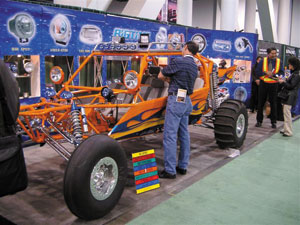China's Auto Industry Consolidates Through Merger
2009/10/08 | By Michelle HsuChina's auto industry has continued to grow steadily despite the global economic recession, and the government there is now planning for the further expansion of the industry through mergers and acquisitions. On Aug. 13 the Ministry of Industry and Information announced a policy of industrial consolidation that lists auto and steel among priority industries for action.
"Industrial consolidation is a necessary step for raising production efficiency and integrating industrial resources," said Industry and Information Minister Lee Yi-jung.
Earlier, in March, China published an auto revitalization plan aimed at the three main objectives of "small cars," "fuel efficiency," and "industrial consolidation." To achieve the third objective, China will provide incentives to encourage mergers among automakers.
Some provincial governments have taken action to support Beijing's auto merger policy. The government of Anhui, for example, is planning to have Chery Automobile propose a merger with the other private automobile and parts makers in the province, forming a group with an annual production of over one million cars supported by two to four large satellite auto parts makers and five or six auto industrial clusters.

While mergers among domestic automakers are mainly for the purpose of resource integration, China's automakers are also strongly interested in acquiring or merging with foreign counterparts so as to take advantage of their advanced technology and international sales networks. Chinese carmakers are active in international M&A activity especially at this time, when international automakers are faced with serious financial problems and are willing to sell at low prices.
A striking example of this M&A activity was the acquisition by Sichuan Tengzhong Heavy Industrial Machinery of GM's Hummer brand in May. Though most industrial observers do not consider this a smart move because of Hummer's serious financial problems, the acquisition is, for China's auto industry, a landmark in terms of internationalization and the exploration of the global market through a foreigner partner's existing sales network.
When the Hummer acquisition was announced, Sichuan Tengzhong Heavy Industrial Machinery was a small, obscure auto company that focused on producing cement mixers and tow trucks. Its acquisition of the Hummer not only gives it a short-cut approach to the global stage, but also expands its operations into the field of passenger cars. Its acquisition of the Hummer's sales network in the U.S. is particularly significant.
A high-ranking GM official commented that his company sold the Hummer to Sichuan Tengzhong because it offered the "best and most comprehensive" conditions in its bidding for the brand. The Chinese company promised not to demand short-term returns, and to increase investment to improve the fuel efficiency of Hummer models. Sichuan Tengzhong will retain the Hummer brand as well as all its production sites and sales network in the U.S. This promise is important to GM, as it secures the jobs of 3,000 hummer workers and over 100 Hummer dealers in the U.S.
The acquisition deal requires GM to continue to supply H2 and H3 Hummer models to Sichuan Tengzhong, which plans to set up its own Hummer production lines in China in the future.
Hummer was launched in the early 1990s as a military vehicle, but it hasn't done well in the civilian market due to its bulky size and gas-guzzling appetite. Sichuan Tengzhong will benefit in several ways from its acquisition, gaining a short-cut to the passenger-car industry, acquiring technology from GM, and becoming the first Chinese automaker to have a solid sales network in the U.S.
Shortly following the sale of Hummer, the financially-battered GM acquired another Chinese partner, forming a strategic alliance with the Shanghai-based SAIC Group for the joint exploration of the Indian market.
To pursue this venture, SAIC will set up an investment company in Hong Kong to engage in exports and technology transfer. The link with GM will be forged through the Hongkong subsidiary.
SAIC needs the partnership with GM to expand its overseas operations. The two companies are commonly regarded as being complementary to each other in terms of finance, technology, and international marketing experience.
Meanwhile, Geely Automobile is talking with Ford Motor about acquiring the American carmaker's Swedish unit, Volvo. Because of its serious financial problems, Volvo is expected to fetch just 2-2.5 billion euros.

Not every international merger is successful, however, and some have sunk into red ink. The Shanghai Automotive Industry Corp. Group (Saicgroup) may suffer big losses if Korea's Ssangyong Motor, of which Saicgroup is the largest shareholder, goes bankrupt.
Ssangyong Motor, the fourth-largest automaker in South Korea with production of 210,000 high-end SUVs and passenger cars in 2008, may have to declare bankruptcy if its creditors, its shareholders, and government representatives fail to agree on how to resolve labor issue by September 22.
Saicgroup paid US$500 million for a 51% stake in Ssangyong in 2004, achieving the first overseas acquisition by China's automobile industry and setting itself up to take advantage of Ssangyong's technology and sales network in both the Korean and overseas markets.
While most other Korean automakers have benefited from the depreciation of the Korean won and seen their stock prices rise in recent months, Ssangyong's stocks tumbled by 15% mainly because of its conflict with a labor union.
Saicgroup is prepared to write off a loss of 3 billion RMB on its investment in the Korean automaker. The failure of the first overseas acquisition by China's auto industry is attributed mainly to a lack of understanding of Ssangyong's corporate culture and the character of Korean workers.
Beijing Automotive Industry Holding's failure in its bid for Opel was probably also due to labor troubles, as Opel's labor union expressed strong opposition to the deal. After that attempt fell through, Beijing Automotive turned its acquisitive attentions to a Diamler Chrysler plant in Fujian Province.
After its failure in bidding for Opel, Beijing Automotive turned its sights to joint venture auto plants in China with the first target being Daimler Chrysler's operations in Fujian Province, established in 2007 with Fujian Motor holding a 50% stake, Daimler Chrysler 33.87%, and Taiwan's China Motor 16.22%.
Beijing Automotive confirmed that it would acquire the 50% stake in Diamler Chrysler's Fujian operation that is held by Fujian Motor, giving it control of the joint venture. Daimler Chrysler currently turns out 40,000 sedans annually in Fujian, and the acquisition will secure Beijing Automotive's leadership position in China's automobile industry.




